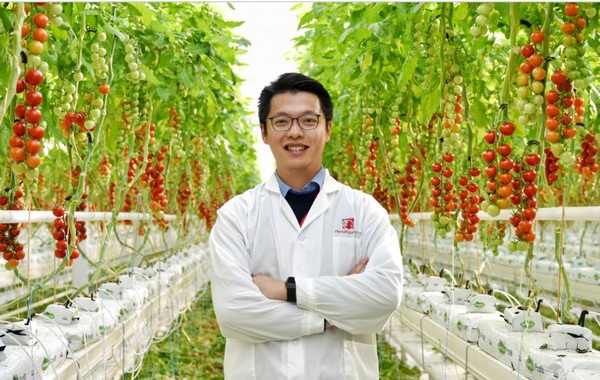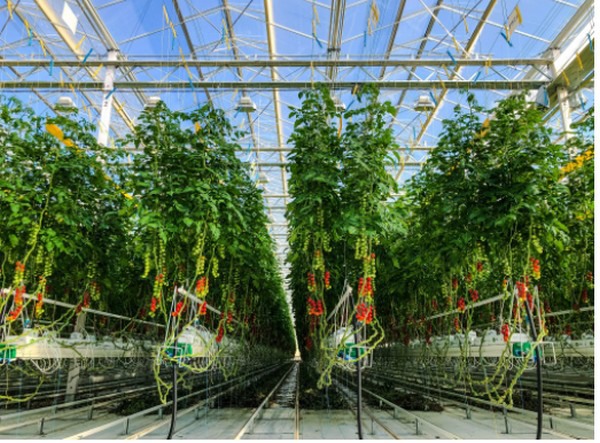A megacity is like a beast that needs to be fed continuously. How can Beijing meet the needs of its city dwellers? That's where high-tech agriculture comes in. In the capital's green belt, Xu Dan and his team are using new techniques to produce vegetables to meet Beijing's growing demand for food.
From Wageningen to Beijing
Wageningen University alumni Xu Dan is the driving force behind one of China's most modern greenhouse facilities. With two years of experience studying the Dutch horticulture sector under his belt, he returned to his native China to grow tomatoes and leaf vegetables. At the HortiPolaris plantation, the knowledge he cultivated in the Netherlands is now being put into practice.

Xu's domain is a series of interconnected greenhouses filled with the ebb and flow benches, an innovative lighting and cooling system, double energy screens, and other modern technology. In this 3.3 hectares area, HortiPolaris produces some 500 tons of cherry tomatoes and 100 tons of lettuce annually – the highest production volume per square meter in China.
Located right next to one of the world's largest cities, HortiPolaris has worked hard on cutting down its delivery times. The company is now able to harvest vegetables and deliver them to the customer in less than a day. This way, Beijing's urban population can delight in a continuous supply of ultra-fresh and healthy products.
Made for China
In all its facets, the HortiPolaris greenhouse resembles a Dutch greenhouse. Xu Dan explains: "Our program design, equipment selection, and installation, including the planting operation system, are all based on Dutch technology and knowledge." At the same time, different environments need different solutions. All technology was adapted to Chinese local climate conditions. Xu: "To design our greenhouse, we sent 50 years' meteorological data from China to a greenhouse design company in the Netherlands. This company did a lot of structural optimization according to our field conditions, especially with regards to extreme weather."

Since starting HortiPolaris, the Wageningen graduate has made great progress in making the best of natural and human resources. Throughout the planting season, Xu's partners in the Netherlands stand by this side. He shares daily reports on current climatological and greenhouse conditions and receives suggestions on planting and greenhouse operations in return.
And just like in the Netherlands, sustainability is an important pillar of Xu's work. "We collect the CO2 from our gas boiler and pump them to the greenhouse for the plants. Every year we collect more than 1,000 tons of CO2 from gas boiler emissions," says Xu. "In addition, we built an artificial wetland ecological filtration system, with different kinds of sand, rocks, and plants inside, as well as fish. We collect all the wastewater from the greenhouse. After filtration, we reuse 100% of the water. This is unique in China and also in the world."
Growing a new generation of farmers
Xu runs the farm with mostly young graduates. As high-tech agriculture is still in its infancy in China, knowledge transfer is an important topic for him. Xu's challenge is not just to train his own employees but also the greenhouse constructors and everyone else involved in the project. In a country where people are more used to small-scale, low-tech agriculture, Xu's plantation is a novelty.
Serving the community
HortiPolaris is dedicated to improving not just its own production but also that of the wider agricultural sector in China. In Dutch style, Xu intends to work together closely with research and development institutes to further his plantation. Xu and HortiPolaris are also involved in setting up an industry alliance to boost cooperation between horticultural companies. In addition, he actively works to boost the incomes of local farmers by sharing best practices and plantation and management skills.
Children are welcome at the plantation as well. Many of Beijing's youth know very little about where their food comes from. HortiPolaris educates children and adolescents on how food is grown using modern techniques and technology, engaging youth to appreciate food better.
Xu serves as an ambassador for Dutch horticulture technology in China. Each year, HortiPolaris organizes training courses for local agricultural entrepreneurs in cooperation with his Dutch partners. This gives more and more Chinese growers the chance to experience the Dutch horticulture knowledge and expertise for themselves.
For more information:
NLplatform
www.nlplatform.com
